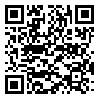شمارۀ جدید فصلنامه (پاییز1404) منتشر شد
Volume 14, Issue 1 (10-2023)
Social Problems of Iran 2023, 14(1): 261-278 |
Back to browse issues page
Download citation:
BibTeX | RIS | EndNote | Medlars | ProCite | Reference Manager | RefWorks
Send citation to:



BibTeX | RIS | EndNote | Medlars | ProCite | Reference Manager | RefWorks
Send citation to:
Kalateh Sadati A, Mohammadi A, Refaiy S. (2023). Skeptical lifeworld and social denial of the virus; a grounded theory in the COVID 19 pandemics. Social Problems of Iran. 14(1), 261-278. doi:10.61186/jspi.14.1.261
URL: http://jspi.khu.ac.ir/article-1-3639-en.html
URL: http://jspi.khu.ac.ir/article-1-3639-en.html
1- , asadati@yazd.ac.ir
Abstract: (1797 Views)
COVID 19 pandemic was one of the most important political, social and medical challenges in the world. While it was predicted that control of the virus in the first wave would be possible, scientists discussed the potential mutations in new variants and the possibility of uncontrollable mutations in the future. It is clear that one of the most important social strategies in the face of the virus is to follow health practices. But for such a thing, the necessity of accepting and understanding the risk is a preliminary matter. From the very beginning and still in all countries, some citizens deny the existence of such a virus and disease. The present study deals with the social reasons and contexts of this issue in Kurdistan province in Iran. The approach of this qualitative study and data was performed through semi-structured and in-depth interviews with 20 people who denied the virus and disease and the data were analyzed by grounded theory method. The themes of the research were constructed under 22 basic concepts and 5 main categories of intentional medicalization, social underestimation, social anxiety and affliction, destiny, and political resistance.
Type of Article: Original Research |
Subject:
Economoc sociology
Received: 2023/06/6 | Accepted: 2023/09/28 | Published: 2023/10/9
Received: 2023/06/6 | Accepted: 2023/09/28 | Published: 2023/10/9
References
1. Bagheri Lankarani, K., Honarvar, B., Kalateh Sadati, A., & Rahmanian Haghighi, M. (2021). Citizens' Opinion on Governmental Response to COVID-19 Outbreak: A Qualitative Study from Iran. INQUIRY. The Journal of Health Care Organization, Provision and Financing, 58 (1), 1-8.
6 [DOI:10.1177/0046958021102490]
2. Buguzi, S. (2021, April 27). Covid-19: Counting the cost of denial in Tanzania. [DOI:10.1136/bmj.n1052]
3. Cabral, S., Ito, N., & Pongeluppe, L. (2021, April 28). The disastrous effects of leaders in denial: evidence from the COVID-19 crisis in Brazil,SSRN. https://dx.doi.org/10.2139/ssrn.3836147 [DOI:10.2139/ssrn.3836147]
4. Fiscella, K., Franks, P., Clancy, CM., Doescher, MP., & Banthin, JS. (1999). Does skepticism towards medical care predict mortality?. PUPMed. ;37(4):409-14. https://doi: 10.1097/00005650-199904000-00010. [DOI:10.1097/00005650-199904000-00010]
5. Cherry, K. (2021). Stress Management Effects on Health:Denial as a Defense Mechanism,Verywellmind, University of California Pres.
6. Falkenbach, M., & Greer, S. (2021). Denial and distraction: How the populist radical right responds to COVID-19; comment on "a scoping review of PRR parties' influence on welfare policy and its implication for population health in Europe". International Journal of Health Policy and Management, 10(9), 578-580. https:// doi: 10.34172/ijhpm.2020.141 [DOI:10.34172/ijhpm.2020.141]
7. Hashim, T., Rassoul, E., El Abed, A., Bchara, J., Ahmadi, A., & Lucero-Prisno, D. E. (2022). COVID-19 denial in Turkmenistan veiling the real situation. Archives of Public Health, 80(1), 1-4. [DOI:10.1186/s13690-021-00779-x]
8. Khadafi, R., Nurmandi, A., Qodir, Z., & Misran. (2022). Hashtag as a new weapon to resist the COVID-19 vaccination policy: a qualitative study of the anti-vaccine movement in Brazil, USA, and Indonesia. Human Vaccines & Immunotherapeutics, 18(1), 1-10. https://DOI: 10.1080/21645515.2022.2042135 [DOI:10.1080/21645515.2022.2042135]
9. Lopes, M. (2021). From Denial to Hope: Brazil Deals With a Prolonged Covid-19 Epidemic course.Nature Immunology,22(3), 256-567. [DOI:10.1038/s41590-021-00875-8]
10. Lin, J., Chou, W., Chang, Y., & Yen, C. (2021). Denial of Justification for Vaccination: Its Multiple Related Variables and Impacts on Intention to Get Vaccinated against COVID-199. PUP Med, (8),822. [DOI:10.3390/vaccines9080822]
11. Marples, M. (2020, August 16). Pandemic Denial: Why Some People con't Accept Covid-19's Realities, CNN.
12. https://flipboard.com/ /f-34b427962bm
13. Miller, B. (2020).Sciense Denial and Covid Conspiracy Theories: Potential Neurological Mechanism and Possible Responses. Jama Network, National Library of Medicine, 324(22), 2255-2256. https:// doi: 10.1001/jama.2020.21332 [DOI:10.1001/jama.2020.21332]
14. Natsios, A. (2022). Pandemic Denialism: The Case of COVID-19. South Central Review, 39(2), 95-116. https://10.1353/scr.2022.0025 [DOI:10.1353/scr.2022.0025]
15. Kalateh Sadati, A., & Bagheri Lankarani, K. (2021). Sanctions, Misinfodemcis, and Polinfodemic during COVID-19: The Need for Global Collaborations. Shiraz E-Medical Journal, 22(5),1-2. [DOI:10.5812/semj.114002]
16. Shahabi, S., Kalateh Sadati, A., Zarei, L., Noroozi, M., Tabrizi, R., Heydari, S., & Bagheri Lankarani, K. (2020). The common concerns regarding the COVID-19 outbreak in Iran: Explored findings from a qualitative study.ResearchGate,20(2),1-3. https:// DOI:10.21203/rs.3.rs-26575/v1 [DOI:10.21203/rs.3.rs-26575/v1]
17. Thagard, P. (2021). The cognitive science of COVID-19: Acceptance, denial, and belief change. ScienceDirect, 195(20), 92-102. https:// doi.org/10.1016/j.ymeth.2021.03.009 [DOI:10.1016/j.ymeth.2021.03.009]
18. Vasilopoulos, A., Pantelidaki, N., Tzoura, A., Papadopoulou, D., Stilliani, K., Paralikas, T., & Mastrogiannis, D. (2022). Factors underlying denial of and disbelief in COVID-19. Jornal Brasileiro de Pneumologia, 48(5) doi: 10.36416/1806-3756/e20220228 [DOI:10.36416/1806-3756/e20220228]
19. Zarei G., & Dehghani Ghahnavieh A. (2022). Corona Virus Prevention and the Role of Marketing Mix in it. Shahid Sadoughi University of Medical Sciences, 30(6):4920-4931. http://jssu.ssu.ac.ir/article-1-5636-en.html [DOI:10.18502/ssu.v30i6.10347]
Send email to the article author
| Rights and permissions | |
 |
This work is licensed under a Creative Commons Attribution-NonCommercial 4.0 International License. |








